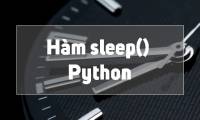
The range () function built into Python is used to create a sequence of numbers starting at 0 by default, incrementing 1 (by default) and ending at a specified number.

Continuing with the topic of built-in functions in Python, the article will introduce you to the map () function with syntax, usage as well as specific examples. Invites you to

In this article, TipsMake.com will learn with you about set (), syntax, parameters and specific examples. Invites you to read the track.

The open () function is built into Python to use to open a file and return the corresponding file object. Follow the article to learn more about the syntax, parameters and usage

Continuing with the topic of Python's built-in functions, the article will introduce you to the iter () function with the syntax, usage as well as specific examples. Invites you

Python's built-in max () function returns the largest element in an iterable or the largest of the passed parameters

The built-in min () function in Python returns the smallest element in an iterable or smallest of passed parameters. So, how does the syntax of min () function work, what

The format () function is built into Python to use to format an input value into a specific format.

The built-in help () function in Python is used to display documents and invoke the help system of modules, functions, classes, keywords ...

The built-in isinstance () function in Python checks whether an object is an instance or a subclass of Classinfo.

The issubclass () function is built into Python to check if an object is a subclass of classinfo.

Regular Expression (RegEx), also known as Regular Expression, is a segment of special characters that follow certain patterns.

Going back to the advanced Python lessons, today TipsMake.com will work with you to learn about @property (decorator) declarations.

Decorator is used a lot in Python. So how to create a Decorator and why you should use it. Let's go find the answer!

In this article, TipsMake.com will work with you to learn about Closure in Python, how to define a Closure and why you should use it. Let's go find the answer!

Module time in Python provides some very useful functions to handle time-related tasks. One of the most commonly used functions is sleep ().

How is the Generator different from iterator and what is the usual function, why should we use it? Let's find out all through this article.

Python has a time module used to handle time-related tasks. TipsMake.com will work with you to find out the details and functions related to the time specified in this module.

How to get the current date and time in Python? There are many different ways to do this, and in this article we will apply the class date, class time in the datetime module to

Instructions to learn how to convert timestamp values into datetime objects and datetime objects into timestamp values in Python
 The range () function built into Python is used to create a sequence of numbers starting at 0 by default, incrementing 1 (by default) and ending at a specified number.
The range () function built into Python is used to create a sequence of numbers starting at 0 by default, incrementing 1 (by default) and ending at a specified number. Continuing with the topic of built-in functions in Python, the article will introduce you to the map () function with syntax, usage as well as specific examples. Invites you to
Continuing with the topic of built-in functions in Python, the article will introduce you to the map () function with syntax, usage as well as specific examples. Invites you to In this article, TipsMake.com will learn with you about set (), syntax, parameters and specific examples. Invites you to read the track.
In this article, TipsMake.com will learn with you about set (), syntax, parameters and specific examples. Invites you to read the track. The open () function is built into Python to use to open a file and return the corresponding file object. Follow the article to learn more about the syntax, parameters and usage
The open () function is built into Python to use to open a file and return the corresponding file object. Follow the article to learn more about the syntax, parameters and usage Continuing with the topic of Python's built-in functions, the article will introduce you to the iter () function with the syntax, usage as well as specific examples. Invites you
Continuing with the topic of Python's built-in functions, the article will introduce you to the iter () function with the syntax, usage as well as specific examples. Invites you Python's built-in max () function returns the largest element in an iterable or the largest of the passed parameters
Python's built-in max () function returns the largest element in an iterable or the largest of the passed parameters The built-in min () function in Python returns the smallest element in an iterable or smallest of passed parameters. So, how does the syntax of min () function work, what
The built-in min () function in Python returns the smallest element in an iterable or smallest of passed parameters. So, how does the syntax of min () function work, what The format () function is built into Python to use to format an input value into a specific format.
The format () function is built into Python to use to format an input value into a specific format. The built-in help () function in Python is used to display documents and invoke the help system of modules, functions, classes, keywords ...
The built-in help () function in Python is used to display documents and invoke the help system of modules, functions, classes, keywords ... The built-in isinstance () function in Python checks whether an object is an instance or a subclass of Classinfo.
The built-in isinstance () function in Python checks whether an object is an instance or a subclass of Classinfo. The issubclass () function is built into Python to check if an object is a subclass of classinfo.
The issubclass () function is built into Python to check if an object is a subclass of classinfo. Regular Expression (RegEx), also known as Regular Expression, is a segment of special characters that follow certain patterns.
Regular Expression (RegEx), also known as Regular Expression, is a segment of special characters that follow certain patterns. Going back to the advanced Python lessons, today TipsMake.com will work with you to learn about @property (decorator) declarations.
Going back to the advanced Python lessons, today TipsMake.com will work with you to learn about @property (decorator) declarations. Decorator is used a lot in Python. So how to create a Decorator and why you should use it. Let's go find the answer!
Decorator is used a lot in Python. So how to create a Decorator and why you should use it. Let's go find the answer! In this article, TipsMake.com will work with you to learn about Closure in Python, how to define a Closure and why you should use it. Let's go find the answer!
In this article, TipsMake.com will work with you to learn about Closure in Python, how to define a Closure and why you should use it. Let's go find the answer! Module time in Python provides some very useful functions to handle time-related tasks. One of the most commonly used functions is sleep ().
Module time in Python provides some very useful functions to handle time-related tasks. One of the most commonly used functions is sleep (). How is the Generator different from iterator and what is the usual function, why should we use it? Let's find out all through this article.
How is the Generator different from iterator and what is the usual function, why should we use it? Let's find out all through this article. Python has a time module used to handle time-related tasks. TipsMake.com will work with you to find out the details and functions related to the time specified in this module.
Python has a time module used to handle time-related tasks. TipsMake.com will work with you to find out the details and functions related to the time specified in this module. How to get the current date and time in Python? There are many different ways to do this, and in this article we will apply the class date, class time in the datetime module to
How to get the current date and time in Python? There are many different ways to do this, and in this article we will apply the class date, class time in the datetime module to Instructions to learn how to convert timestamp values into datetime objects and datetime objects into timestamp values in Python
Instructions to learn how to convert timestamp values into datetime objects and datetime objects into timestamp values in Python























